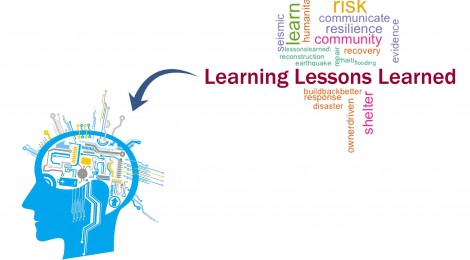
Learning “lessons learned” from past disasters
It is shocking how many “lessons learned” documents rehash the same lessons that had supposedly been learned already. The conclusion seems clear: we are very good at researching, developing and compiling lessons learned, but very bad at learning them!
So why don’t we learn the lessons from past disasters?
Note that I am not asking here the question of “why do failed approaches get repeated following every disaster?” This is admittedly the more important question, but I will shy away from it for the time being. If the question above essentially comes down to “why don’t we do better?”, I am currently asking the smaller question of “why don’t we know better?
My short answers to this are:
(1) The post-disaster reconstruction field lacks institutional memory, due primarily to extremely high staff turnover (linked to funding on project level rather than mission), lack of staff training (funded usually from overhead), and our inability to share lessons across geographies and scales.
(2) There is an exaggerated focus on the uniqueness of disaster situations, rather than their commonalities. Hence we too easily disregard past lessons as irrelevant.
(3) At the same time, “lessons learned” documents are often made irrelevant by focusing entirely on the “solutions” that were found (which are often not transferable) rather than the “processes” leading to such solutions. Focusing on processes would make such documents more relevant and transferable across contexts.
(4) We are overly caught up in action and don’t take the time to think (and read). The day-to-day activities related to post-disaster response and reconstruction are often all-consuming. There is very little opportunity for strategic thinking and analysis, which would require reading lessons learned from past experiences. There is also very little funding for this type of analysis in post-disaster contexts. Analysis would take away from more pressing needs to deliver projects, show results, disburse funds, etc.
We will be extending this conversation with more posts. This post simply attempts to frame the question, and touch upon some of the issues we care about and will explore further.
Why do we harp on this issue of learning and knowledge? Humanitarian response, post-disaster recovery, urban and community planning, disaster risk management and all other fields within the broader realm of “development” require real expertise and knowledge, but are not treated as such. No politician will tell a doctor how to treat her patient, and no one will tell an engineer how to design a bridge. But it seems that every architect has “the solution” for shelter in Haiti, management consulting firms can design national reconstruction agencies, actors and army generals can devise successful relocation plans for thousands, and anyone who has donated $10 to the Red Cross via a text message can tell you how it should be spent. All these trivialize the incredible complexity of post-disaster reconstruction and management. Pushing back against this means demonstrating our expertise and knowledge of the field, including past experiences and approaches.
Knowledge is also important because knowledge is what distinguishes a mistake from negligence. By better defining and taking ownership of the body of knowledge, we can better separate real lessons (things that were un-anticipated), from negligence (things that were known). This should all serve to bring more accountability to programs, and empower those with real expertise.
So the next time we ask “why don’t we do better?” at least it will not be attributed to lack of knowledge, and will help to identify the more systemic reasons.









[…] David Lallemant [also of the engineering ilk] has posed some very helpful questions on ‘learning lessons’ post-disaster on the collaborative blog resilient urbanism. […]